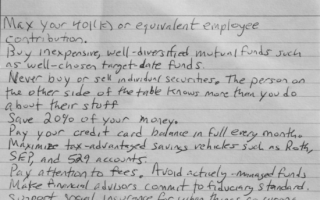
Money advice is everywhere, but not all of it is true. Some financial myths persist for years, making it harder for people to make informed choices. These myths can lead to bad habits, wasted money, and missed opportunities. If you want to build real wealth and avoid common mistakes, you need to know what’s fact and what’s fiction. Here are 12 financial myths you should stop believing right now. Clearing up these misunderstandings can help you take control of your money and make better decisions every day.
1. You Need a Lot of Money to Start Investing
Many people believe that investing is only for the wealthy. That’s not true. You can start investing with small amounts, sometimes as little as $5 or $10. Many apps and online platforms let you buy fractional shares, so you don’t need to save up hundreds of dollars to get started. The most important thing is to start early and be consistent. Even small investments can grow significantly over time thanks to the power of compound interest.
2. Credit Cards Are Always Bad
Credit cards get a bad reputation, but they aren’t always the enemy. Used responsibly, credit cards can help you build credit, earn rewards, and protect your purchases. The key is to pay off your balance in full every month. Carrying a balance and paying interest is what gets people into trouble. If you use credit cards wisely, they can be a helpful financial tool.
3. Renting Is Throwing Money Away
Many people say renting is a waste because you’re not building equity. However, renting can make sense for many people. It gives you flexibility, fewer responsibilities, and sometimes lower costs. Homeownership comes with additional expenses, such as maintenance, property taxes, and insurance. Renting isn’t always a bad financial move—it depends on your situation and goals.
4. You Must Have a Perfect Credit Score
A perfect credit score sounds nice, but it’s not necessary. Most lenders consider scores above 740 to be excellent. You don’t need a score of 850 to get good rates on loans or credit cards. Focus on paying your bills on time, keeping your credit utilization low, and not opening too many new accounts at once. These habits will help you maintain a strong credit score without stressing over perfection.
5. You Should Always Buy in Bulk
Buying in bulk can save money, but not always. If you buy more than you can use before it expires, you’re wasting money. Some items, like fresh food, can go bad quickly. It’s smart to buy non-perishable items in bulk if you have the space and will use them. But don’t assume bulk is always better—check the unit price and only buy what you need.
6. All Debt Is Bad
Not all debt is created equal. Some debt, like student loans or a mortgage, can help you reach important goals. The key is to borrow responsibly and understand the terms. High-interest debt, like credit card balances, can be dangerous. But using debt to invest in your future, like education or a home, can be a smart move if you have a plan to pay it off.
7. You Don’t Need an Emergency Fund If You Have Credit
Relying on credit cards or loans in an emergency can lead to more debt. An emergency fund gives you a safety net for unexpected expenses, like car repairs or medical bills. Aim to save at least three to six months’ worth of living expenses. This way, you won’t have to rely on high-interest credit when life throws you a curveball.
8. You Can’t Save If You Don’t Make Much Money
It’s tough to save on a tight budget, but it’s not impossible. Even small amounts add up over time. Begin by tracking your spending and identifying areas where you can cut back. Set up automatic transfers to your savings account, even if it’s just a few dollars a week. The habit of saving is more important than the amount at first.
9. You Should Always Max Out Your 401(k)
Maxing out your 401(k) is great if you can afford it, but it’s not the only way to save for retirement. If you have high-interest debt or no emergency fund, focus on those first. At a minimum, contribute enough to get your employer’s match if they offer one. After that, balance your retirement savings with other financial priorities.
10. You Need to Be an Expert to Manage Your Money
You don’t need a finance degree to handle your money well. Basic skills like budgeting, saving, and understanding interest rates go a long way. There are plenty of free resources online to help you learn. The most important thing is to pay attention to your money and make informed choices.
11. More Income Means More Wealth
Earning more money helps, but it doesn’t guarantee wealth. If you spend everything you make, your income won’t matter. Building wealth is about saving, investing, and living below your means. Focus on growing your income while managing your spending simultaneously.
12. Financial Planning Is Only for the Wealthy
Financial planning isn’t just for people with lots of money. Everyone can benefit from having a financial plan. A good plan helps you set goals, track progress, and avoid costly mistakes. You can start simple—write down your goals, make a budget, and review your progress regularly. Over time, you can adjust your plan as your situation changes.
Take Control of Your Financial Future
Believing these financial myths can hold you back from reaching your goals. The truth is, smart money management is possible for everyone, no matter your income or background. Start by questioning what you’ve heard, learning the facts, and making choices that fit your life. The sooner you let go of these myths, the sooner you can build a stronger financial future.
What financial myth have you heard that turned out to be false? Share your story in the comments.
Read More
How Young is Too Young for a Credit Card?
5 Xtreme Saving Ideas (Warning: May Be a Little Gross)

Travis Campbell is a digital marketer and code developer with over 10 years of experience and a writer for over 6 years. He holds a BA degree in E-commerce and likes to share life advice he’s learned over the years. Travis loves spending time on the golf course or at the gym when he’s not working.






Comments